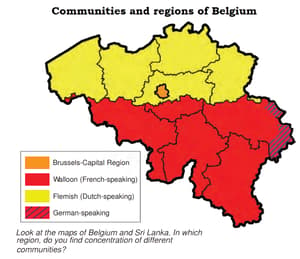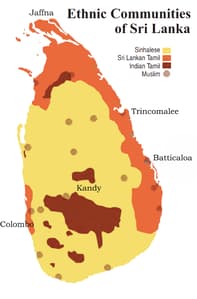Belgium and Sri Lanka
Belgium and Sri Lanka: Overview
The topic does a comparative and relative study between the population majority in the countries, Belgium and Sri Lanka. It discusses the complexities of the ethnic composition of both countries, despite being small in size and less population.
Important Questions on Belgium and Sri Lanka
Consider the following two statements on power-sharing and select the answer using the codes given below:
A. Power-sharing is good for democracy.
B. It helps to reduce the possibility of conflict between social groups.
Which of these statements are true and false?
Consider the following statements about power-sharing arrangements in Belgium and Sri Lanka.
A. In Belgium, the Dutch-speaking majority people tried to impose their domination on the minority French-speaking community.
B. In Sri Lanka, the policies of the government sought to ensure the dominance of the Sinhala-speaking majority.
C. The Tamils in Sri Lanka demanded a federal arrangement of power-sharing to protect their culture, language and equality of opportunity in education and jobs.
D. The transformation of Belgium from unitary government to a federal one prevented a possible division of the country on linguistic lines.
Which of the statements given above are correct?
Different arguments are usually put forth in favour of and against power-sharing. Identify those arguments which are in favour of power-sharing and select the answer using the codes given below? Power-sharing:
A. Reduces conflict among different communities.
B. Decreases the possibility of arbitrariness.
C. Delays decision-making process.
D. Accommodates diversities.
E. Increases instability and divisiveness.
F. Promotes people’s participation in government.
G. Undermines the unity of a country.
Look at the map of Belgium and Sri Lanka. In which region do you find concentration of different communities?


I have a simple equation in mind. Sharing power = dividing power = weakening the country. Why do we start by talking of this?
Read the following passage and pick out any one of the prudential reasons for power-sharing offered in this.
"We need to give more power to the panchayats to realize the dream of Mahatma Gandhi and the hopes of the makers of our Constitution. Panchayati Raj establishes true democracy. It restores power to the only place where power belongs in a democracy - in the hands of the people. Giving power to Panchayats is also a way to reduce corruption and increase administrative efficiency. When people participate in the planning and implementation of developmental schemes, they would naturally exercise greater control over these schemes. This would eliminate the corrupt middlemen. Thus, Panchayati Raj will strengthen the foundations of our democracy."
The Mayor of Merchtem, a town near Brussels in Belgium, has defended a ban on speaking French in the town's schools. He said that the ban would help all non-Dutch speakers integrate into this Flemish town. Do you think that this measure is in keeping with the spirit of Belgium's power-sharing arrangements? Give your reasons in about words.
Which of the three conclusions, drawn by three different students given below, do you agree with and why? Give your reasons in about words.
Thomman - Power-sharing is necessary only in societies which have religious, linguistic or ethnic divisions.
Mathayi - Power-sharing is suitable only for big countries that have regional divisions.
Ouseph - Every society needs some form of power-sharing even if it is small or does not have social divisions.
State one prudential reason and one moral reason for power-sharing with an example from the Indian context.
